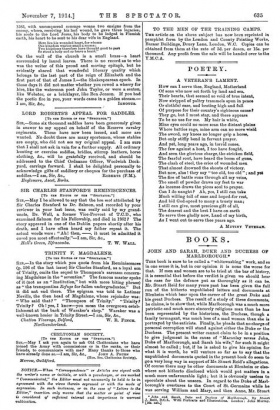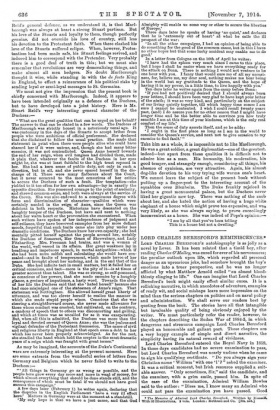BOOKS.
JOHN AND SARAH, DUKE AND DUCHESS OF' MARLBOROUGH.* Tms book is sure to be called a " whitewashing " work, and so in one sense it is, but in our opinion it is none the worse for that. If men and women are to be tried at the bar of history, it is essential that before the verdict is given we should hear the case for the defence put as thoroughly as it can be. Mr. Stuart Reid for many years past has been given the full run of the hitherto unpublished letters and documents at Blenheim which bear upon the career of the great Duke and his great Duchess. The result of a study of these documents, he claims, is to show that, while Marlborough was a much more patriotic and much more sincerely religious man than he has been represented by the historians, the Duchess, though a family termagant, was much less of a mad woman than she is portrayed by the satirists. Finally, he pleads that no charge of personal corruption will stand against either the Duke or the Duchess. The present writer cannot claim to be in a position to give judgment in the cause of "Macaulay versus John, Duke of Marlborough, and Sarah his wife," for such it might almost be called ; but, if he is asked to give his opinion for what it is worth, he will venture so far as to say that the unpublished documents quoted in the present book do seem to go a very long way in support of Mr. Stuart Reid's allegations. Of course there may be other documents at Blenheim or else- where not hitherto disclosed which would put matters in a much more unfavourable light ; but it is obviously useless to speculate about the unseen. In regard to the Duke of Marl- borough's overtures to the Court of St. Germains while he was serving William and Mary, and then Anne, Mr. Stuart • John and Sarah, Duke and Duchess of Marlborough. By Stuart J. Reid, D.C.L. With Portraits and Illustrations. London : John Murray. (16s. net.] Reid's general defence, as we understand it, is that Marl- borough was always at heart a strong Stuart partisan. But his love of the Stuarts and loyalty to them, though perfectly genuine, did not override his love of country, still less his devotion to the Protestant faith. When these clashed his love of the Stuarts suffered eclipse. When, however, Protes- tantism had been made safe, his Stuart feelings revived, and induced him to correspond with the Pretender. Very probably there is a good deal of truth in this ; but we must also remember that revolutions are very demoralizing things, and make almost all men hedgers. No doubt Marlborough thought it wise, while standing in with the de facto King in England, to effect a reinsurance of his political risks by sending loyal or semi-loyal messages to St. Germaine.
We must not give the impression that the present book is chiefly concerned with Marlborough. Indeed, it appears to
have been intended originally as a defence of the Duchess, but to have developed into a joint history. Here is Mr. Stuart Reid's very interesting general character of the
Duchess :—
" What are the great qualities that can be urged on her behalf ? The answer to that can be stated in a few words. The Duchess of Marlborough was strictly honest in a notoriously venal age. It was customary in the days of the Stuarts to accept bribes from people who were ambitious of official preferment. She declared that she disdained to follow the usual practice. She made that statement in print when there were people alive who could have shamed her if it were untrue, and, though she had many bitter enemies, it was not contradicted. Queen Anne herself towards the end of her reign, when evil tongues had divided them, made it plain that, whatever the faults of the Duchess in her eyes might be, she was at least faithful to the high trust reposed in her. She had a keen sense of public duty, not only in such a direction, but in all, and she never spared herself in the dis- charge of it. There were many flatterers about the Court, but it never occurred to the most censorious of her critics to accuse the Duchess of such a fault. Her temptation—she yielded to it too often for her own advantage—lay in exactly the opposite direction. She possessed courage to the point of audacity, and shrewd common-sense, and both were always at the service of the Crown. She was also endowed to a conspicuous degree with force and discrimination of character—qualities which were certainly needed in the reign of Anne, since the Queen was deficient in both respects. Historians have descanted on the haughty temper of the Duchess, but have said next to nothing about her warm heart or the provocation she encountered. When such writers have spoken of her independence of judgment and self-reliance, they have borrowed examples from her more defiant moods, forgetful that such traits came also into play under less dramatic conditions. The Duchess knew her own capacity; she had mentally pitted herself against the people around her, notably the Duchess of Somerset, Her Grace of Shrewsbury, and Lady Fitzharding. Mrs. Freeman had brains, and was a woman of the world, well versed in its affairs. Her great weakness lay in headlong and impetuous speech, in mortal antipathies—which if she had been more selfish and calculating she would have con- cealed—and in faults of temperament, which made havoc of her peace and brought about her undoing, and in the end that of the Duke. She had infinite tact in small matters, but it failed her on critical occasions, and tact—more is the pity of it—is at times of greater account than talent. She was so strong, so self-possessed, so conscious of her powers, that she made enemies by a haughty glance, a gesture of impatience, a hasty word. Towards the close of her life the Duchess said that she 'hated herself' because she had once misjudged one of the statesmen of Anne's reign. That statesman was Nottingham. She allowed herself great liberty of utterance, and was too clever herself to realize the manner in which she made stupid people wince. Conscious that she was steering a straightforward course, she never made allowance for those whose conduct was crooked, but cultivated, on the contrary, a candour of speech that to others was disconcerting and galling, and which at times was as uncalled for as it was exasperating. But, when all this is admitted, the Duchess was more than the loyal and devoted servant of Queen Anne ; she was the jealous and vigilant defender of the Protestant Succession. The cause of civil and religious liberty in England at that epoch owes a debt to her which has never been properly acknowledged. As for the rest, she steadied the hand which held the sceptre in the most dramatic years of a reign which was fraught with great issues."
As may be imagined, the accounts of the Duke's Continental wars are extremely interesting at the present moment. Here are some extracts from the wonderful series of letters from Germany and Belgium which he never failed to write to the Duchess :—
All things in Germany go as wrong as possible, and the people here grow every day more and more in waqt of money, for which almost everything that should be done stands still, and the consequence of which must be fatal if we should not have good success this campaign.'
A few days later (February 1) he writes again, declaring that the disputes in the English Parliament have a very ill effect here. Matters in Germany were at the moment at a standstill. 'My only hope is that we have a just cause, and that God Almighty will enable us some way or other to secure the liberties of Europe.'
Three days later he speaks of having 'no quiet,' and declares that he is 'extremely out of heart' at what he calls the ill prospect of the war :
'In all the other campaigns, I had an opinion of being able to do something for the good of the common cause, but in this I have no other hopes but that some lucky accident may enable me to do good.'
In a letter from Cologne on the 10th of April he writes : `I have had the spleen very much since I came to this place, but I hope I shall be easier when we have everything ready for the attack on Bonn. There is nothing I would not venture to be one hour with you. I fancy that would cure me of all my uneasi- ness, for, believe me, my dear soul, nothing makes me bear being in the world but my gratitude to the Queen, and the hope of having it in my power, in a little time, to live happily with you.'
Ten days later he writes again from the camp before Bonn:
'If you had not positively desired that I should always burn your letters, I should have been very glad to have kept your letter of the ninth; it was so very kind, and particularly on the subject of our living quietly together, till which happy time comes I am sure I cannot be contented. I wish I could recall twenty years past, (and) I do assure you for no other reason that I might have longer time and be the better able to convince you how truly sensible I am at this time of your kindness, which is the only real comfort of my life.'
Then the sense of duty asserts itself, and so he adds :
'I ought in the first place as long as I am in the world to consider the Queen's service, and next not to give occasion to my enemies to find fault.'" Take him as a whole, it is impossible not to like Marlborough. He was a great soldier, a great diplomatist—one of the greatest. indeed—but apart from these qualities it is difficult not to admire him as a man. His humanity, his moderation, his good temper, and strangely enough, considering all things, his absence of cynicism, are very attractive. Again, his almost dog-like devotion to his very trying wife warms one's heart. We cannot leave the subject of the present book without putting up a finger-post to the interesting account of the squabbles over Blenheim. The Duke frankly rejoiced in having a great monumental palace, but the Duchess never liked her gigantic new toy. There was nothing of the snob about her, and she bated the notion of having a huge white elephant of a house which might prove too expensive, and was very likely, as she was always saying, to prove exceedingly inconvenient as a home. She was indeed of Pope's opinion "I see by all that you've been telling
This is a house but not a dwelling."















































 Previous page
Previous page